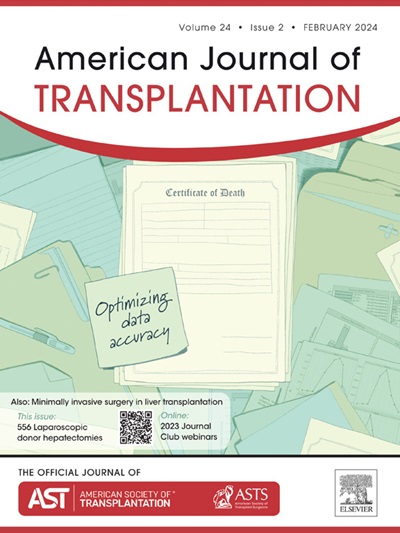High dimensional profiling of immune responses to kidney transplant reveals heterogeneous T helper 1 and B cell effectors associated with rejection.
IF 8.9
2区 医学
Q1 SURGERY
引用次数: 0
Abstract
Rejection is a primary cause of allograft dysfunction after kidney transplantation. Diversity of immune subpopulations involved in the different endotypes of rejection remains to be delineated at single-cell resolution. In a cohort of 76 kidney transplant recipients, we conducted high-dimensional immune phenotyping of blood CD4 T and B cells, single-cell RNA and T/B cell receptor sequencing and plasma cytokine profiling. Phenotypic, transcriptional and clonal states of CD4T and B cells could significantly distinguish stable allograft state from rejection. Patients undergoing T-cell mediated rejection displayed accumulation of clonally expanded of cytotoxic T helper (Th)1 cells and of Th17-like cells, associated with predominant naive B cell responses. In contrast, antibody-mediated rejection was characterized by clonal expansion of Th1-polarized T follicular helper (Tfh) cells and effector T-bet+ memory B cells, both of which strongly expressed IL-12 and TNF-signaling pathways. Plasma cytokine analysis confirmed mixed Th1/Th17 and Th1/Tfh-driven inflammatory profiles distinguishing T-cell mediated rejection and antibody-mediated rejection, respectively. CD4T and B cell subpopulations and signatures were validated by bulk RNA-seq analysis of matched kidney allografts and using an independent single-cell RNAseq dataset. These data improve mechanistic understanding of immune pathogenesis of rejection and support development of more specific immunosuppressive therapies to treat allograft rejection.肾移植免疫反应的高维剖析揭示了与排斥反应相关的异质性 T 辅助细胞 1 和 B 细胞效应因子。
排斥反应是肾移植后异体移植物功能障碍的主要原因。参与不同排斥反应内型的免疫亚群的多样性仍有待于单细胞分辨率的界定。在一组 76 名肾移植受者中,我们对血液 CD4 T 细胞和 B 细胞进行了高维免疫表型分析、单细胞 RNA 和 T/B 细胞受体测序以及血浆细胞因子分析。CD4T和B细胞的表型、转录和克隆状态可显著区分稳定的异体移植状态和排斥反应。T细胞介导的排斥反应患者体内细胞毒性T辅助细胞(Th)1和Th17样细胞克隆扩增,并伴有主要的幼稚B细胞反应。相反,抗体介导的排斥反应则表现为Th1极化T滤泡辅助细胞(Tfh)和效应T-bet+记忆B细胞的克隆扩增,这两种细胞都强烈表达IL-12和TNF信号通路。血浆细胞因子分析证实了Th1/Th17和Th1/Tfh驱动的混合炎症特征,分别区分了T细胞介导的排斥反应和抗体介导的排斥反应。CD4T和B细胞亚群和特征通过匹配肾脏异体移植物的批量RNA-seq分析和使用独立的单细胞RNAseq数据集得到了验证。这些数据增进了对排斥反应免疫发病机制的了解,有助于开发更具特异性的免疫抑制疗法来治疗异体移植排斥反应。
本文章由计算机程序翻译,如有差异,请以英文原文为准。
求助全文
约1分钟内获得全文
求助全文
来源期刊
CiteScore
18.70
自引率
4.50%
发文量
346
审稿时长
26 days
期刊介绍:
The American Journal of Transplantation is a leading journal in the field of transplantation. It serves as a forum for debate and reassessment, an agent of change, and a major platform for promoting understanding, improving results, and advancing science. Published monthly, it provides an essential resource for researchers and clinicians worldwide.
The journal publishes original articles, case reports, invited reviews, letters to the editor, critical reviews, news features, consensus documents, and guidelines over 12 issues a year. It covers all major subject areas in transplantation, including thoracic (heart, lung), abdominal (kidney, liver, pancreas, islets), tissue and stem cell transplantation, organ and tissue donation and preservation, tissue injury, repair, inflammation, and aging, histocompatibility, drugs and pharmacology, graft survival, and prevention of graft dysfunction and failure. It also explores ethical and social issues in the field.

 求助内容:
求助内容: 应助结果提醒方式:
应助结果提醒方式:


